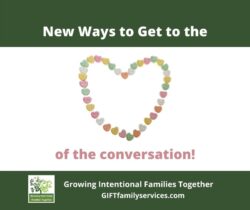At the heart of every conversation is a desire to connect with another person. It involves a speaker and a listener. Each is an essential component. Communication is an interactive loop of listening and speaking.
Unlike an inhaled breath that enters our body intact, the meaning of one’s words is infinitely varied. Tone, volume, body language, and emphasis all influence how our words are received and perceived. Consider the simple two-word sentence, “I can.” Imagine speaking it in several ways: with surprise, with defiance, with anger, with pride, with hope… The same two words can communicate totally distinct messages.
Is it any wonder that our communications so often go awry? Too often our words impact our listener in a way we did not intend. Instead of feeling understood, we feel invalidated and unheard. Instead of finding comfort, we find rejection or indifference. This is also true in conversations between parent and child where conversations mismatches are not uncommon. While love and connection were the intentions at the heart of the conversation, the reality proves quite the opposite.
Recall for a moment a conversation which you began with high hopes only to find your effort crashing on the rocks like a faltering ship. A mom described her heartfelt effort to share a connecting conversation “it drifted away like a helium balloon without a string.” The sense of her good intentions ending in disappointment is palpable. I suspect we have all experienced similar hope and disappointment.
Communication would appear to be a simple affair. One person speaks, the other listens, and then they switch positions. The listener becomes the speaker and the speaker becomes the listener. From direct experience, we all know that this idealized, serene interaction is the stuff of fairytales.
Too often our family conversations don’t create warm fuzzies. If we are honest with ourselves the motive at the heart of those conversations is grounded in a different intention and has a different agenda. Those conversations are usually thinly veiled efforts to lecture, nag, micromanage, and criticize. Unsurprisingly, those kinds of conversations do not come across as very loving, engaging, or satisfying.
Adoption adds additional layers to this communication dynamic and so the possibility of a miscue increases. Research has revealed that adoptees often listen through “filters” that reflect any/some/all of the Seven Core Issues of Adoption*. It is important for us as informed, Adoption Attuned parents to keep them in mind. Remember too, that we also have our tender spots that can be easily and unintentionally triggered by an awkward turn of phrase or tone-deaf, clueless yet well-intentioned conversation.
As we aim to keep love and connection at the heart of our conversations, we do well to pause, reflect and be intentional when we speak. When it is our turn to listen, how can we keep connection at the heart of the conversation then? Listen to this month’s podcast for tips on how to be an effective listener.
We would love to hear your thoughts, Email us at GIFTfamilyservices.com or leave a comment on our
Facebook page. Check out our
Instagram and
Twitter accounts.
*The Seven Core Issues of Adoption are:
- Loss,
- Rejection,
- Guilt and Shame,
- Identity,
- Intimacy
- Mastery and Self-control,
- Grief
 If you are interested in reading more about these core issues, read
If you are interested in reading more about these core issues, read
“The Seven Core Issues of Adoption and Permanency”
Learn how the coaches at GIFT Family Services can help you and your family navigate your adoption journey. We’ve faced our share of family challenges and crises, ridden the metaphorical rollercoaster, and our families have not only survived; they have thrived. We offer experience, neutrality, and understanding. GIFT coaches are available to present workshops online. Contact us : 1-800-653-9445
__________________________

 If you are interested in reading more about these core issues, read
If you are interested in reading more about these core issues, read

